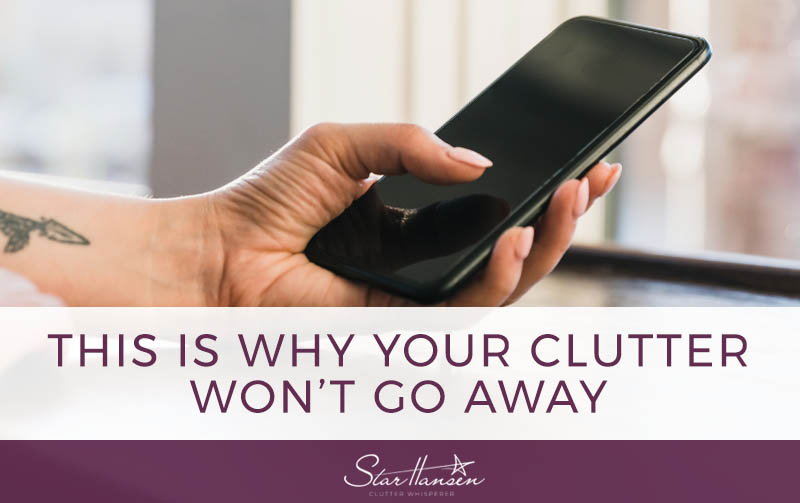This is Why Your Clutter Won’t Go Away
I was under the covers, scrolling Instagram this morning, when I came across a quote by UPenn Positive Psych Instructor Cory Muscara. He said:
“Some of the greatest pain we experience comes from resisting the pain we’re experiencing.”
In the post, he talks about Primary Pain, the pain from the actual painful experience…which we can’t escape because—life.
Then he talks about Secondary Pain. Secondary pain is the resistance to the primary pain. The feelings of “Oh no, I can’t do this” or “What does this mean about me?” or “Not again?!”
Secondary pain is normal, but it often leads to distracting behavior to help us avoid touching that pain. It can also lead to a shame spiral that causes the need for bigger distractors and mediators to ease our new layer of pain.
I see this a lot with clutter.
We have items that are charged with the painful moments of our lives. The love letter from your ex, the dress you can’t fit into anymore, the bill that didn’t get paid, the box of stuff from your aunt’s house when she passed away.
It can sometimes feel like too much to face these feelings. So we avoid it and subconsciously layer things on top of that item to delay or avoid those feelings.
Then we have feelings about the growing piles of clutter and layer more on top of those items. Or perhaps we walk away from our organizing projects and grab another pint of ice cream, a glass of wine, or the remote control.
Secondary Pain can often do more damage than Primary Pain. It leads to shame, lack of trust in ourselves, anxiety, overwhelm, and depression. It can also be longer-lasting because now we have an actual project to manage (clutter to clear, weight to lose, etc.) on top of the big feelings we’re sitting with.
What would it look like to be present to the painful feelings in your life?
I know it can feel like if you feel those feelings, they might kill you. I promise you they won’t. It’s not easy to do, but it doesn’t last forever. And when you’re done, you will feel so much better.
It’s important to know what you need around processing big feelings, though. The first few times I really went deep down the emotional rabbit hole, I needed a therapist or trauma specialist to walk with me. Today I have trusted friends who stand with me when the emotional storms roll in. Some people journal; others run, write poetry or paint.
There are a thousand ways to process the feelings that get buried in your clutter. What are yours?
Cory very sagely says
“This is a lifelong practice.”
And I couldn’t agree more. We are first and foremost in relationship with ourselves. Beyond our partners, friends, family, kids, co-workers, home, stuff…your primary relationship is with yourself.
The more you give yourself the gift of leaning into the difficult feelings, the more freedom you will claim for yourself.
I know it’s not easy, but you don’t have to do it alone. In my Meaning of Stuff Group Course, we go deep into how to notice, address, and process the uncomfortable feelings that are buried in your clutter. Once you know how to do this, the clutter won’t feel impossible to face anymore.
Because unless you can face the painful feelings buried in your clutter, you will always need the clutter to be there (and growing). Address the feelings, release the clutter.
I’m so glad you’re here. Just the fact that you’re reading this right now is a huge sign that you’re ready to care for yourself and make a big shift in your life.
Don’t worry. You don’t have to do anything right now. You’ll take action when the time is right. It will just feel right. And I’ll be here every step of the way.





